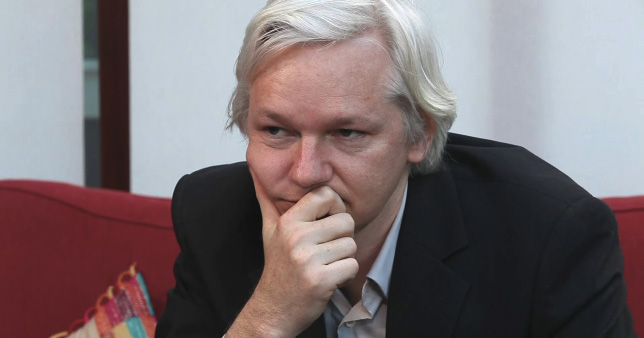

|
||

WikiLeaks has accused Ecuador for cutting off Internet access of its founder, Julian Assange. The activist organization first reported the incident via Twitter last night stating that Assange’s internet link has been intentionally severed by a state party. In a follow up tweet a few hours ago, WikiLeaks reported: “Ecuador cut off Assange’s internet access Saturday, 5pm GMT, shortly after publication of Clinton’s Goldman Sachs speechs.”
— “The WikiLeaks founder has been living at the Ecuadorean Embassy in London for more than four years. ... Assange sought refuge there after Sweden issued a warrant for his arrest to question him over allegations of sex crimes. He has said that if sent to Sweden, he fears he would be handed over to the U.S. and could face trial over the release of classified U.S. material on WikiLeaks.” NPR / 17 Oct 2016
— Update / 18 Oct 2016: Peter Van Buren, former officer, US State Department’s Foreign Service in an RT interview: “It is unlikely that Ecuador, supporting whistleblower Julian Assange, deprived him from the opportunity to use internet. ... At the same time, imagining the reasons a third party might have cut that internet access are fairly easy to do. Assange has embarrassed the US government. The US government has made claims that he is working with the Russians, and that the Russians with Assange are trying to disrupt or interfere in America’s election. And we’ve seen reports over the weekend that the US is planning some form of retaliation in cyberspace. It is not unlikely that that retaliation may include poking the bear in the nose, perhaps starting with cutting off Assange’s internet access.”
— Update / 18 Oct 2016: Ecuador has released a statement confirming it has restricted Assange’s access to the Internet. The full official letter below –
Official Communiqué
Ecuador granted political asylum to Julian Assange in 2012 based on his legitimate fears of political persecution because of his journalistic activities as the editor of WikiLeaks.
In recent weeks, WikiLeaks has published a wealth of documents, impacting on the U.S. election campaign. This decision was taken exclusively by that organization.
The Government of Ecuador respects the principle of non-intervention in the internal affairs of other states. It does not interfere in external electoral processes, nor does it favor any particular candidate.
Accordingly, Ecuador has exercised its sovereign right to temporarily restrict access to some of its private communications network within its Embassy in the United Kingdom. This temporary restriction does not prevent the WikiLeaks organization from carrying out its journalistic activities.
Ecuador, in accordance with its tradition of defending human rights and protecting the victims of political persecution, reaffirms the asylum granted to Julian Assange and reiterates its intention to safeguard his life and physical integrity until he reaches a safe place.
Ecuador’s foreign policy responds to sovereign decisions alone and does not yield to pressure from other states.
Sponsored byRadix

Sponsored byWhoisXML API

Sponsored byVerisign

Sponsored byVerisign

Sponsored byDNIB.com

Sponsored byIPv4.Global

Sponsored byCSC
